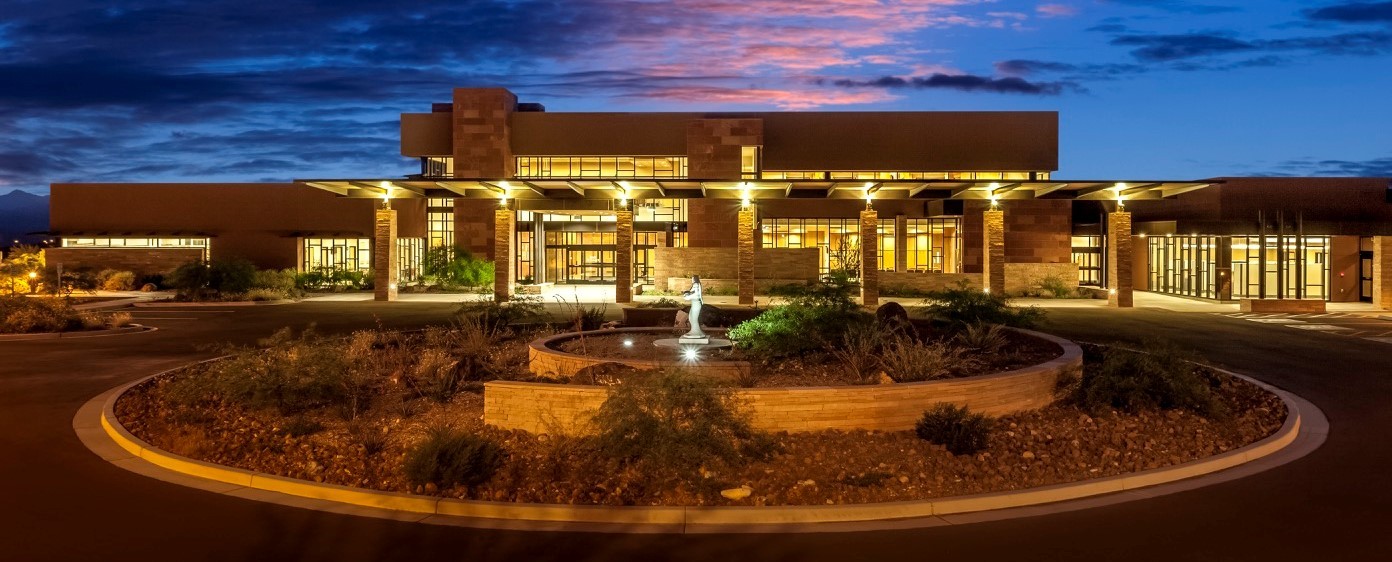About an hour and forty five minutes east of Phoenix, nestled in the foothills of the mountains, sits one of the most impressive healthcare facilities in Arizona. The drive out to the San Carlos Apache reservation is nothing short of stunning. Highways winding through vast desert landscapes with saguaro cacti, rugged cliffs, and red canyons. It’s the kind of drive that showcases how beautiful this state really is. Then when you finally arrive, what’s happening inside the facility is just as amazing as the drive.
What makes San Carlos Apache Healthcare truly remarkable is that it doesn’t just operate as a clinic—it exists as a healing space deeply rooted in Apache values. Traditionally known to the tribe as Izeeʼ Baa Gowąh, or “The Medicine House,” this facility was built not only to deliver modern medical and dental care but to honor Gozhǫǫ; a core belief in Apache culture that centers on living with goodness, balance, harmony, and beauty. That spirit is felt the moment you step through the doors. Every interaction, every treatment plan, every act of service is infused with a sense of purpose that goes beyond clinical outcomes. Here, healing isn’t just physical, it’s cultural, emotional, and spiritual. Being a part of this mission has deepened my understanding of what wellness truly means and has grounded my work in a much larger tradition of community care and intergenerational strength.
The dental clinic in San Carlos is a tribal-run, state-of-the-art facility offering a full spectrum of services, from pediatric dentistry and oral surgery to general anesthesia, endodontics, implants, and even same-day crowns. The level of care offered here rivals any modern clinic in a major metro area, but what makes this place exceptional isn’t just the technology. It’s the people.
I’m grateful every day to be part of a dental team that is not only clinically skilled but committed to working collaboratively across specialties, something that, in my experience, is not always the norm in other dental settings. Here, pediatric dentists, general dentists, oral surgeons, and endodontists, work side by side, not just sharing space, but sharing responsibility. We consult one another, we plan cases together, and we learn from each other. That kind of synergy enhances patient care in a way that truly puts the patient first.
My time at San Carlos has expanded me, both as a clinician and as a person. I’ve grown in my ability to coordinate complex care, manage advanced cases with a multidisciplinary lens, and most importantly—listen deeply to the families we serve. Because behind every dental concern is a child navigating a complex web of social, cultural, and economic realities.
Serving the San Carlos Apache community has brought into sharp focus the social determinants of health that continue to impact Native populations. Many of our patients face systemic barriers that go far beyond oral health: high rates of diabetes, food insecurity, transportation difficulties, limited access to preventive education, and intergenerational trauma. These challenges don’t just influence a child’s dental condition, it shapes how families access care, perceive care, and trust the healthcare system as a whole.
Despite these barriers, what I witness every day is strength. I see families who drive hours from areas even more remote for an appointment. I see parents & caregivers asking thoughtful questions, wanting to do better for their children. And I see a healthcare team that meets them with compassion, cultural sensitivity, and a commitment to excellence.
The facility itself is a reflection of that commitment. It’s not just about fixing teeth, it’s about restoring dignity, function, and confidence. I’ve had the privilege to offer care under general anesthesia for children who otherwise couldn’t be treated safely in a traditional operatory. I’ve coordinated with oral surgeons to plan difficult extractions of supernumerary teeth or biopsies of suspicious lesions. I’ve worked with general dentists to facilitate care for teenagers & young adults that still have severe anxiety related to dental care. I even consult with primary care physicians to discuss underlying health issues that impact oral health & vice versa.
And in doing so, I’ve learned more than I ever expected. I’ve learned how powerful it is to practice in a setting where every member of the team shares a mission. I’ve learned that working in rural tribal healthcare requires not just skill, but humility and flexibility. And I’ve learned that the most meaningful care comes not from doing it all yourself, but from showing up as part of a team that uplifts each other.
I carry these lessons with me everywhere I go. San Carlos has reminded me that when healthcare is built around trust, collaboration, and cultural respect, we don’t just treat patients we transform communities.
To the staff, the families, and the community that has welcomed me: thank you. Thank you for letting me be part of something so special. I’m a better provider and a better person because of it.
